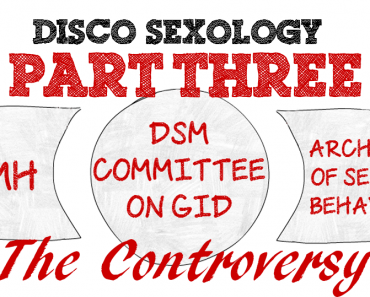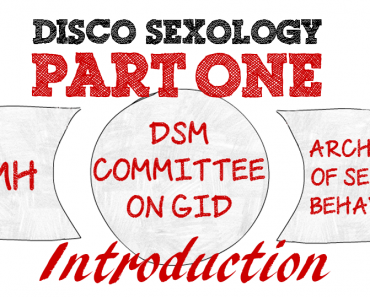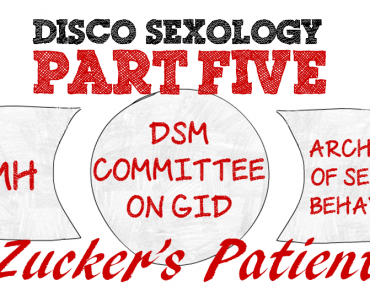Interventions designed to prevent, halt, or reverse non-cisgender experiences are known as conversion therapy. The scientific consensus is that these practices are “pseudoscientific,” and experts on torture have identified these pseudoscientific practices as “torture.” As such, these interventions represent Adverse Childhood Experiences (ACEs), which are scientifically demonstrated to cause brain damage, life-long disabilities, and significantly shortened lifespans. In short, severe emotional abuse is torture; conversion interventions are severe emotional abuse, interventions designed to prevent, halt, or reverse non-cisgender experiences are conversion therapies, and as such, irreparably harm the developing amygdala, hippocampus, and connecting nerve fibers within the developing brains of trans youth.
While it is true that ACE-related experiences of crushing anxiety, toxic shame, and guilt are not uncommon pathological aspects related to the DSM-5 diagnosis of “Gender Dysphoria,” merely having a non-cisgender experience of self is, scientifically speaking, not pathological. What is pathological are the ACE effects anti-trans people and systems cause and promote.
Because conversion interventions are pseudoscientific torture, not supported by scientific evidence, and causes irreparable harm to children, the following medical, psychological, psychiatric, neurological, and youth expert professional organizations support evidence-based care, also known as affirmative care: the American Academy of Child and Adolescent Psychiatry, American Academy of Family Physicians, American Academy of Nursing, American Academy of Pediatrics, American Academy of Physician Assistants, American Association for Marriage and Family Therapy, American Association of School Administrators, American College of Physicians, American Counseling Association, American Federation of Teachers, American Medical Association, American Medical Student Association, American Medical Women’s Association, American Mental Health Counselors Association, American Psychiatric Association, American Psychoanalytic Association, American Psychological Association, American School Counselor Association, American School Health Association, the Child Welfare League of America, the Clinical Social Work Association, Devereux Advanced Behavioral Health, Mental Health America, the National Alliance for Mental Health, the National Association of School Nurses, the National Association of School Psychologists, the National Association of Secondary School Principals, the National Association of Social Workers, the National Education Association, the Pan American Health Organization, the School Social Work Association of America, The Association of LGBTQ Psychiatrists, the Voice for Adoption, the World Medical Association, and the World Professional Association for Transgender Health.
This is why these practices are currently banned in California, Colorado, Connecticut, Delaware, Hawaii, Illinois, Maine, Maryland, Massachusetts, Michigan, Minnesota, Nevada, New Hampshire, New Jersy, New Mexico, New York, Oregon, Rhode Island, Utah, Vermont, Virginia, and Washington. Moreover, state and federal funding supporting conversion therapy practices is banned in Arizona, North Carolina, Pennsylvania, and Wisconsin. It’s worth noting that the European Union is currently working to ban the practice under Article 3 of the European Convention on Human Rights.
Affirmative Care
In 2004, the radical feminist and clinical psychologist Arlene Lev published Transgender Emergence: Therapeutic Guidelines for Working with Gender-Variant People and Their Families, which advocated against the use of operant conditioning aimed at preventing, halting, or reversing a non-cisgender experience of self because outcomes were consistently poor. In 2008, the American College of Physicians used Lev’s approach, contrasting an “affirmative” model of care with conversion therapy. While the lexical concept of “affirming care” for transgender youth is missing from the DSM-5, the concept of phenotype sex dysphoria as being essential to the experience of Gender Dysphoria returned so that youth could no longer receive a DSM diagnosis for mere gender nonconformity alone, as they could under the DSM-IV. Affirmative care recognizes that phenotype sex dysphoria and mere gender nonconformity are different things and require different therapeutic approaches when presenting in a clinical context. Prevention intervention advocates insist that youth with phenotype sex dysphoria be regarded and treated as gender non-conforming youth in the non-evidence-based belief that phenotype sex dysphoria is itself gender nonconformity. Conversion therapy advocates cite DSM-IV studies, noting that since 80% of DSM-IV gender nonconforming youth became gender-conforming, that must, therefore, mean 80% of youth with DSM-5 phenotype sex dysphoria will likewise become gender-conforming. All of these claims are refuted by scientific evidence.
The American Psychiatric Association (APA) notes that “Gender Affirming Therapy is a therapeutic stance that focuses on affirming a patient’s gender identity and does not try to ‘repair’ it” and that gender-affirming care focuses on addressing shame, depression, self-harm, the effects of violence, sexuality support, care for social stigma, and, if appropriate for the specific client, supportive medical care inclusive of a gender spectrum. The APA further states that gender-affirming care has 6 core attributes, including “gender affirmation, space for processing and understanding, linking to social supports, legal services, health care providers, creating a safe zone, allowing for diversity, and reflection and empathy.” The APA’s description of affirming care comports with that of the U.S. Department of Health and Human Services’ definition, which describes affirming care as “patient-centered” care consisting of “an array of services that may include medical, surgical, mental health, and non-medical services” because it is “critical in fostering better outcomes for transgender, nonbinary, and other gender expansive children and adolescents.” Similarly, the University of California stated that affirmative care should have “no preconceptions” concerning the direction the youth’s gender should develop.
Affirmative care recognizes that gender nonconforming youth and youth with phenotype sex dysphoria are not the same diagnostic population, which means that there is no one-size-fits-all approach for working with non-cisgender youth. While all affirmative care seeks to address and mitigate the harm of ACEs, it does not seek to direct youth towards any gendered designation because non-cisgender experiences of self are just as valid as cisgender experiences of self. Those who practice affirming care follow the evidence and know that while some gender nonconforming youth will become gender-conforming as they get older, some will not; however, they also know the science demonstrates that almost all youth with phenotype sex dysphoria will persist in suffering with it and no intervention will make the youth cisgender. The evidence-based response to phenotype sex dysphoria is pausing natal puberty to not make the dysphoria worse by forcing permanent natal puberty changes upon the youth while simultaneously giving the youth more time to get therapeutic and psychiatric support. In affirming care, older adolescents (16 to 18) may undergo the more permanent changes of medical puberty. At the same time, conversion advocates will seek to impose the permanent changes of natal puberty as soon as possible, regardless of age. When young adults receiving affirmative care reach the age of medical majority, they may legally make doctor- and therapist-recommended medical decisions, including reconstructive surgery. At the same time, conversion advocates will seek to prevent, halt, or reverse medical decisions, regardless of one’s legal rights.
Adverse Childhood Experiences (ACEs)
ACEs are traumatic events that occur during childhood (0-17 years) and involve, for example, aggression, abuse, or neglect, which are definitional features of non-affirming care treatments. Affirmative care primarily focuses on one thing above and beyond all else: mitigating the effects of ACEs. Everything that the American Psychiatric Association identified as being essential attributes of affirmative care are evidence-based therapeutic approaches to prevent, halt, or reverse the harm caused by ACEs. To borrow language from the American College of Physicians, affirming care is a therapy that isn’t conversion therapy.
Transgender children and adolescents are at an elevated risk of ACEs due to widespread stigma, discrimination, and exclusion. Exposure to practices intended to prevent, halt, or reverse non-cisgender experiences of self has been highlighted as a form of psychological abuse. It is linked to an increased risk of despair, anxiety, and suicide among transgender people. Add to this the convergence of transphobia with other types of discrimination, such as racism, ableism, and classism, which are also frequently encountered by transgender youth; the effect of ACE exposure is compounded.
Worse, promoters of the very things that drive depression, anxiety, stress, trauma, and suicidal ideation in trans youth often point at the suffering they cause as proof that merely being transgender is problematic.[1] Likewise, those causing real and lasting neurological damage to trans youth often attempt to reason that their promotion of torture is motivated by (unfounded) concerns about the neurological well-being of trans youth,[2] often making the pseudoscientific claim that youth must undergo the permanent changes of natal puberty or else the youth’s neurology will be damaged.[3]
While it is claimed by conversion therapy advocates that affirmative care must be banned because transgender children get sex surgeries, such claims are false. Trans youth do not and cannot receive sex surgeries in the US.[4] The only youth sex surgeries in the US are cisgender sex surgeries; it is medically unethical to perform sex surgeries on trans children. Even so, cisgender culture promotes cisgender sex surgeries that result in the death of more than 100 babies each year, year in and year out. Moreover, cisgender culture likewise promotes intersex genital mutilation. While the scientific consensus is that there is no medical reason for cisgender sex surgeries to be performed, conversion therapy activists will shut down child hospitals with bomb threats because they wrongly believe that “affirmative care” means sex surgeries for trans children.
Just as false is the claim that children must be forced to undergo natal puberty. Conversion therapy often attempts to leverage puberty as part of its operant conditioning to reinforce a cisgender identity. While the use of puberty blockers in trans youth gives the youth more time for psychological and psychiatric care before any permanent body modifications occur, whether that happens through natal or medical puberty, conversion therapy activists argue against pausing puberty. Those promoting conversion therapy will often sealion, espousing various non-evidence-based “concerns” over how puberty blockers affect bone[5] and neurological development.
Those espousing so-called “gender critical” policy currently favor brain-damaging child torture over evidence-based care and almost never act in good faith. There are only two approaches to trans care: conversion-based ideology and affirmative care. There is scientifically valid, evidence-based affirmative care endorsed by the world’s medical, psychological, psychiatric, and youth expert professional organizations. Then, there is child torture known to cause brain damage and chronic suicidal ideation, often promoted by fake professional groups run by conversion advocates.
[1] From House Oversight Committee testimony: “While anti-trans activists level harmful accusations that being transgender causes people to reject their family, isolate from friends, and harm themselves, it’s clear from the research that the opposite is true and that a trans young person’s family acceptance or rejection is a major influencing factor in a trans person’s mental health and well-being. LGBT youth who feel supported by their families are 62.5% less likely to attempt suicide than those whose families are unsupportive.”
[2] This comes from the American College of Pediatricians. This anti-gay pro-conversion therapy hate group is frequently mistaken for the genuine medical group, the American Academy of Pediatrics, which, of course, supports gender-affirming care because it is evidence-based.
[3] Consider this: the written testimony of 100s concerning the Texas ban on evidence-based trans care. Search the document for “brain” and note how common this talking point is.
[4] Some anti-trans activists will claim that a mastectomy for young adults who were unable to access puberty blockers is proof of trans sex surgeries on children. Likewise, they will point to the rare older teen who is under 21 but is of the age of medical majority and who, with the support of a medical, psychological, and psychiatric team, and with the support of their parents, obtain true sex surgery as proof that trans children (not young adults) are having sex surgeries.
[5] Pausing puberty pauses puberty-related bone development, which means that trans youth who have not yet undergone puberty will not have post-puberty bone development until they have gone through puberty, whether that is natal or medical puberty.


